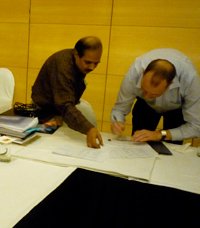Feb 14 2010
Challenges in developing cost-effective, efficient and stable solar energy systems are being tackled by two government-led solar research projects.
 Dr A Mukhopadhyay (Department of Science and Technology, India) and Dr Jason Green (Engineering and Physical Sciences Research Council, UK) sign the record of decisions at the end of the joint UK-India panel meeting.
Dr A Mukhopadhyay (Department of Science and Technology, India) and Dr Jason Green (Engineering and Physical Sciences Research Council, UK) sign the record of decisions at the end of the joint UK-India panel meeting.
Two research projects focussed on photovoltaics, launched by the UK and Indian governments, are set to tackle some of the main challenges in developing cost-effective, efficient and stable solar energy systems.
Funded by Research Councils UK (RCUK) and the Government of India (GOI) Department of Science and Technology (DST), each organisation has committed up to £5 million over a three-year period.
Solar energy has been identified by both the UK and India as an area of significance in providing solutions to the problem of meeting future energy needs. It was highlighted in the UK’s 2007 Energy White Paper as one of the technologies that will help the country meet its 20% renewable targets by 2020.
The ‘Advancing the efficiency and production potential of excitonic solar cells’ project will focus on the development of materials, device structures, materials processing and photovoltaic-panel engineering of *excitonic solar cells. It will build on existing research in both the UK and India to develop cheaper and scalable solar cell manufacture. The project has been awarded £2.5 million by RCUK, which is matched by DST.
A second project, ‘Stability and performance of photovoltaics’, aims to remove known bottlenecks in materials supply and develop novel device designs that are significantly cheaper and more efficient than current solar cells. The RCUK grant value is £2.4 million, which is equalled by DST.
Dr Neil Bateman, Engineering and Physical Sciences Research Council (EPSRC) Energy Portfolio Manager said: “These projects represent a new and exciting collaboration between some of the leading photovoltaics researchers in the UK and India. The research is targeted at pushing the science of solar energy towards cheaper, more reliable and sustainable electricity production in a wide variety of settings.”
The projects form part of the RCUK Energy Programme led by EPSRC and the Solar Energy Research Initiative of the DST (GOI), and are in line with an ongoing goal of strengthening collaboration between UK and Indian research institutions.
* excitonic solar cells (ESCs) are a class of non-conventional solar cells based on organic and nanostructured materials.
The research groups comprise leading universities in the UK and Institutes in India, plus companies from both countries.